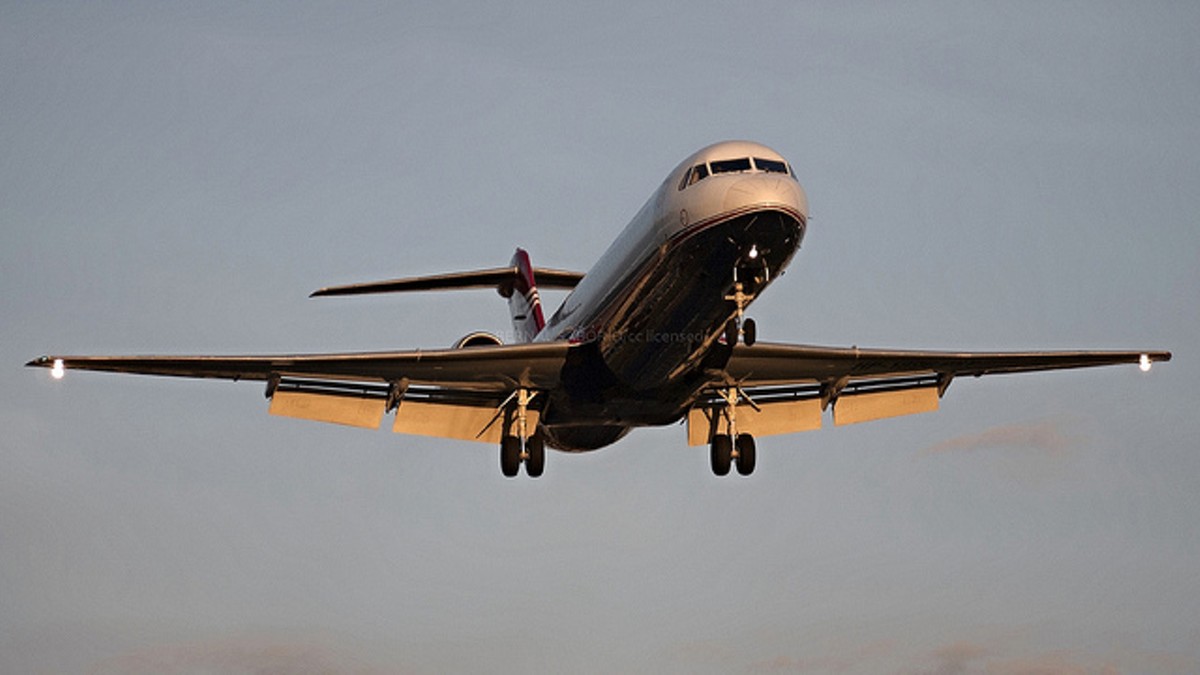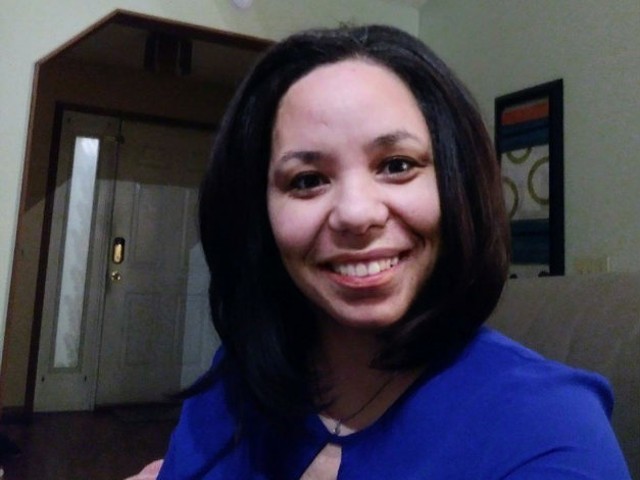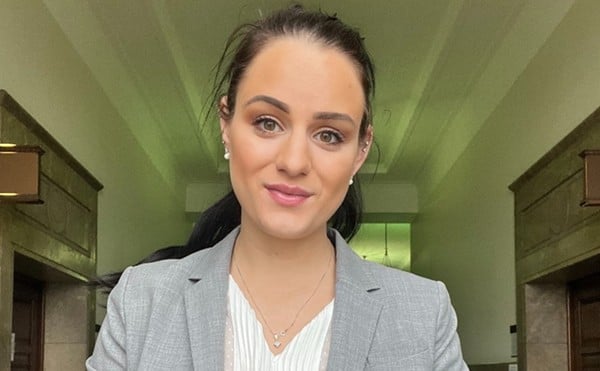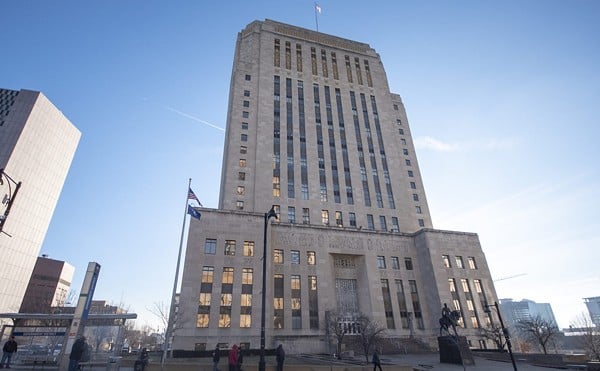The city of St. Louis took generations to topple fully from its peak as one of the nation's biggest cities. It took its airport less than a decade.
In 2000, the airport moved 30 million passengers, making it the 16th busiest in the country. The previous twenty years had seen Lambert-St. Louis International Airport strain under the pressure of its status as a TWA hub, with flights frequently left circling or delayed on the tarmac. Plans were made to build — and then came 9/11, the nationwide air-travel downturn, the Great Recession and airline industry shakeups.
From 2003 to 2004, the number of passengers traveling by air through St. Louis dropped by seven million. In just a few years, daily flight totals plummeted by the hundreds, and those losses were cemented by the elimination of the airport's American Airlines hub in 2009. By the end of the decade, the airport was moving only 40 percent of the traffic it had in 2000 and no longer offered direct service to Europe.
Like St. Louis, whose Gateway Arch serves as a memorial to the myth of non-stop expansion, Lambert Airport, too, has a monument to lost frontier: a 9,000-foot concrete runway, built for $1.1 billion, the most expensive public improvement project in St. Louis history. Planned with the high traffic of the 1980s and '90s in mind, the runway erased a north county neighborhood only to open in 2006 to an industry that suddenly had little use for it. It's currently being used for just 10 percent of arrivals and departures.
As Francis Slay departed Lambert on a warm day last March, the city's mayor would have been able to watch that stretch of concrete shrinking into the distance. Eleven years prior, he had cut the ribbon to open the runway for business. Even then, he'd known far too little was coming.
But maybe it doesn't have to be that way. That possibility propelled Slay to the nation's capital, where on March 22, 2017, he submitted the city's preliminary application to the Federal Aviation Administration's "Airport Privatization Pilot Program" — a program that provides a pathway for publicly owned airports to test the waters of the private sector.
Though Congress created the pilot program in 1997, only two airports have ever completed it, and the first — a small airport in Orange County, New York — reverted to the Port Authority of New York and New Jersey when its private operator cut bait after four years.
Today, the only U.S. commercial service airport run by private means is the Luis Muñoz Marín International Airport in San Juan, Puerto Rico. In 2012, the Puerto Rican government signed a 40-year lease with Aerostar Airport Holdings. For offloading its airport, Puerto Rico got a lump sum of $615 million and the promise of an additional $550 million over the life of the lease. The deal also included a $1.4 billion capital improvement plan.
In 2016, before storms decimated the island last year, the FAA ranked Luis Muñoz Marín as America's 43rd busiest airport. If Lambert, which is 32nd on that list, were to go private, it would be largest American airport to make the leap.
In April, the FAA announced that it was awarding St. Louis one of the five open slots in the pilot program, allowing the city to begin the process of searching for a private operator. The Trump administration, then championing a trillion-dollar infrastructure initiative, cheered the city's first step. "As we've already seen in San Juan," noted Secretary of Transportation Elaine Chao, "this approach to airport management increases productivity, revenue and operating efficiency for airports, creating greater access to capital for infrastructure needs."
St. Louis' new mayor, Lyda Krewson, added her own congratulatory statement, though she offered a more tempered optimism. She called the pilot program "a great opportunity to explore a public private partnership for the airport," adding, "As always, the key is in the details."
Since then, those details have proven scarce, and in their absence suspicion has grown over the matter like a blanket of ivy. Slay's former top lieutenants, who stood alongside him as St. Louis considered the pilot program, are now connected to entities poised to profit from a privately run airport. And Krewson's administration is keeping its cards close to the chest, angering other city lawmakers.
Adding to the ire, the man funding the city's free market exploration is none other than billionaire financier Rex Sinquefield, a figure variously described as either the city's most generous benefactor or its shadiest bogeyman.
The controversy has roiled for months. On one side, lobbyists and city officials insist that all they're advocating for is an informed discussion. On the other, some lawmakers and some airport watchdogs warn that St. Louis is wagering its most valuable asset in a rich man's game.
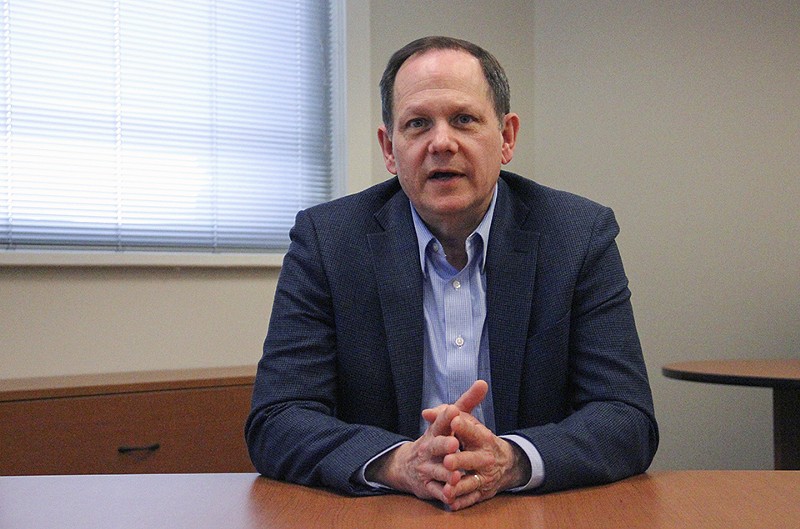
Francis Slay's new digs at the law firm Spencer Fane aren't shabby by any stretch, but they're no Room 200 in City Hall. The conference room where he meets a reporter on a recent Friday afternoon lacks the wood-paneled gravitas of his old office's antechamber. Still, the new environment seems right for the former mayor, who's dressed casually, tieless in a dark gray blazer and blue shirt.
Since leaving office in April — capping a sixteen-year mayoral run — Slay has hardly made a peep on public issues. He says he declines all media requests that ask him to weigh in on his chosen successor, Lyda Krewson. He knows how hard it is to be mayor; she doesn't need a critic harping from the sidelines.
On the matter of his own administration's role in airport privatization, though, Slay is willing to open up, particularly to defend himself from accusations that he's somehow letting Sinquefield get his hands on the airport. But even as the privatization process has become plagued by political infighting, he professes to have no regrets.
"Looking back I don't think we would have done it any differently," Slay says. "Because if we would have done it differently we wouldn't even be here."
Slay says his path to considering privatization began in late 2015, when he was approached by former Obama administration official David Agnew, who had moved on to lobbying for Australia-based investment firm Macquarie Group. Agnew pitched the FAA's pilot program as a way to improve the airport and open up revenue sources for the city. Agnew's firm wasn't the only party eyeing a possible role of running St. Louis' airport, and over the next year, Slay says he started looking into what it would take to nab a spot in the pilot program.
But even with the city's acceptance, there are numerous places the deal could stall. Privatization is, of course, dependent on finding a lessee with favorable terms. And any deal is subject to an army of potential vetoes, including ones from the FAA, the airlines, the Board of Aldermen and the city's three-person Board of Estimate and Apportionment. The city charter would also have to be amended, which would require approval by either the aldermen or by St. Louis voters in a special election.
To Slay, the pitfalls were worth the possible rewards. "Something bold and big needs to happen to our airport," he says. Slay is quick to note the airport's recent improvements under director Rhonda Hamm-Niebruegge, whom he appointed. The airport moved nearly 15 million total passengers in 2017, and will add five flights to Iceland later this year. It's increased passengers for four consecutive years.
"But these are all baby steps," Slay warns. He believes the airport can be more, and he holds up the past as potential: "We need to be where we used to be. And we're not even close."
Slay knew the process, even under a rosy scenario, wouldn't be cheap. Chicago, which twice came achingly close to privatizing Chicago Midway International Airport, reportedly spent millions on the snowballing costs to hire experienced consultants and negotiate with private operators.
St. Louis was already spending millions to try to keep an NFL team and retain its contract with the National Geospatial-Intelligence Agency. Slay says he didn't have the cash to throw around.
"So," he says, preparing to dig into arguably the most divisive aspect of the airport deal, "that's when I talked to Rex Sinquefield."
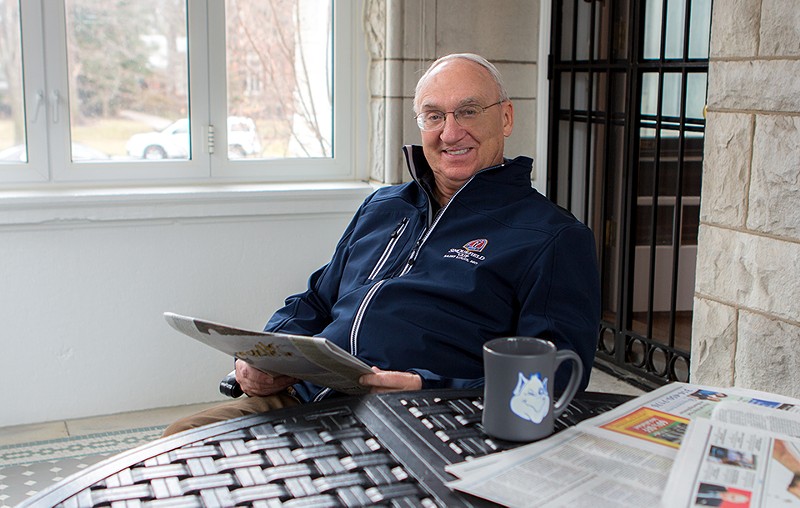
The meeting, arranged at Slay's behest, took place in the Kingside Diner in late 2016. At the time, Slay was eyeing the end of his political career. Sinquefield was one of Slay's largest campaign donors, and the retired investor's fortune had backed the 2012 initiative that gave the city control over its police department, something Slay had long desired.
Still, in a Democratic city, Slay concedes, "Rex can be controversial." The free-market enthusiast has tried unsuccessfully to eliminate the state income tax, and his dogged attempts to kill St. Louis' earnings tax put him and Slay on opposite sides of a critical matter.
"He has very strong feelings on issues that I'm diametrically opposed to," Slay acknowledges. "But if he and I can work on things for the benefit of the people of St. Louis, then I'm going to do it." And when it came to the FAA's pilot program, "I was hoping that he would look at this as a civic gesture that would benefit the region."
The meeting also included Travis Brown, CEO of the PR shop Pelopidas and Sinquefield's longtime lobbyist. To his audience of two, Slay laid out the case for privatizing the airport.
Basically — in the best possible world — a competent private operator could take over Lambert, infusing the airport with cash for infrastructure improvements and money the city could use for desperately needed projects. Under federal law, a commercial airport's revenue is locked in a circuit, redirecting its revenue back to the airport (although St. Louis has been grandfathered in under a small exemption that sees the airport kick $6.5 million into the general fund annually). Privatization could mean a much bigger windfall.
Philosophically on board for anything that shrinks government, Sinquefield "didn't need a lot of convincing" to commit resources to backing the city's application, says Slay.
Aware of the whispers surrounding Sinquefield, Slay insists there's no conspiracy at play — he says the retired financier expressed no designs on profiting from the venture. Still, during that meeting, he admits that Sinquefield suggested that a St. Louis flush with new revenue could start thinking about repealing that pesky earnings tax.
"I'm not saying he didn't bring it up," Slay says. "There was absolutely no commitment on that at all. What I presented to Rex had nothing to do with the earnings tax."
After the meeting, Sinquefield was in.
With only a few weeks left in office, Slay made multiple research trips to Washington D.C., along with Brown. On March 16, one week before submitting the preliminary application to the FAA, Slay and then-City Counselor Michael Garvin signed a "memorandum of representation" with the three parties who would guide the city through the FAA's byzantine requirements: McKenna and Associates, a Beltway consultant firm; the Wicks Group, a private equity company that would prepare the actual application; and a Sinquefield-backed lobbying entity, Grow Missouri.
The agreement was signed on the condition that any costs for the application would be handled by Grow Missouri and McKenna , but it included a crucial caveat: The money would only be reimbursed if privatization went through. Beyond the mayor's office, other city and airport officials were in the dark.
Slay says he understands the frustration with the secrecy, but he bristles at the suggestion that the process was somehow tainted. He was the mayor, after all.
"I was elected to make decisions on behalf of the people of St. Louis," he says. "What should I have done? You have a vote of the Board of Aldermen and decide whether or not you file the application? I don't know what that means."
He acknowledges that the lack of transparency has its trade-offs. In recent months, city lawmakers have mounted a serious pushback, pointing to Slay's deal with Sinquefield and a contract that appears to incentivize consultants to push a deal through, come hell or unfavorable terms for taxpayers.
The former mayor is worried critics are missing the bigger picture. There's not even a deal to debate yet.
"I understood going in that this wasn't going to be a simple smooth process," he says. "But ultimately as mayor you have to be an opportunist, you have to be able to take advantage of those opportunities when they exist."
He set the table. Now he's hoping Krewson can guide the city toward a good plan.
"If it's not good for the airport and the future of the region, it shouldn't happen," Slay argues. "But," he continues, stabbing his finger into the table with each word, "we won't know unless we know what that deal is."
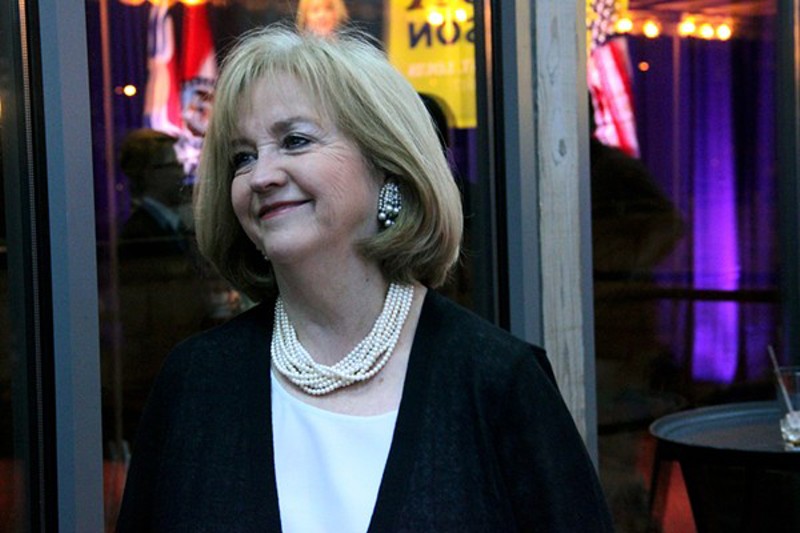
We still don't know what the deal is. But the 82-page application Slay submitted to the FAA last year provides a compelling summary of what the city hopes it could accomplish.
The Request for Qualifications, or RFQ, lays out the city's objectives. Simply put, St. Louis has put too much money into the airport. And it needs cash.
Servicing the airport's debt, which at one time totaled $1 billion, currently eats up around 43 percent of Lambert's annual budget. At its current rate of repayment, the city says, the airport won't pay off its remaining $600 million of debt (plus $300 million in interest) until 2048.
Airport officials tout recent credit rating upgrades from Moody's, Fitch and S&P Global Ratings — which each upgraded Lambert from "stable" to "positive" — as reason for optimism. But any deal to lease the airport would do more than just get a good rate for the debt service; it would wipe out the debt entirely. Under federal law, privatization deal cannot go forward while an airport has debt on its books.
And that could benefit not just the airport, but the city — officials anticipate that a privatized airport would send an annual remittance much bigger than the $6.5 million it currently gets. In fact, it foresees a windfall — payments "four to ten times larger than the city transfers expected today," according to the RFQ.
"If a private operator was selected and an upfront payment structure was chosen, the City would expect to free up more than one billion in capital for non-Airport uses," the RFQ claims.
A billion dollars is nearly twice the sum paid up front to Puerto Rico. And by virtue of being part of the U.S. but also located in the Caribbean, that airport clearly has more strategic potential for airlines.
But Travis Brown says the point isn't just the dollar amount. He believes a private operator could increase flights.
"Let's face it," says Brown, "we have a lot of debt, and it was built for a larger operation that has never materialized. We basically built an airport for 2,000 airport operations a day, and we're not typically seeing 300."
Sinquefield hasn't released any statements about his motivations. The billionaire generally shuns contact with the press, which leaves Brown fielding questions about the man Politico called "King Rex."
"Rex is not a king," Brown says. Sinquefield has no plans to make money off airport operations, he insists, "now or in the future."
Rather, Brown argues, Sinquefield "should be considered the patron saint of St. Louis."
"He's retired," Brown says several times. "He doesn't have any commercial interest in any airport. That presents him as a philanthropist of the region, who is uniquely poised to be able to carry a lot of professional assistance."

Ultimately, Brown estimates that Grow Missouri will have to hire "several dozen professionals" and put in "thousands of hours" of labor. And only if the airport goes private does Grow Missouri get reimbursement. Before that happens, Grow Missouri and its partners aim to conduct a full assessment of the airport, including a financial audit and a wider study of the strategies a private entity could use to take advantage of its potential.
"This process can take two or three years to get right," he says. "That's why it's cumbersome for most cities; that's why you don't see a lot of cities doing an application to get an initial slot. That's why we were pleased that St. Louis is in pole position with this new infrastructure movement in Washington."
Whether such an infrastructure movement actually materializes, only Trump knows (and he probably doesn't). But it's worth noting that, despite Brown's estimate of a two to three year process, the city's FAA application suggested a more ambitious timeline.
In fact, under Slay's outline, the city should have already signed its contract with a consultant, released a request for proposals, negotiated with bidders, placed a charter amendment on the ballot, and agreed to a final lease with a private operator. Ostensibly, the deal would be signed and closed by May.
Literally none of those benchmarks has been hit. And if you ask some city lawmakers, the delay is a good thing. They want nothing to do with King Rex.

On January 16, a notice taped to a wall with no fanfare announced a meeting of the city's selection committee "for airport advisory services in the potential lease of St. Louis Lambert International Airport."
It was a sharp reminder that the privatization process had quietly continued under Mayor Krewson. When word of the meeting got out, several aldermen crashed it. (Krewson declined to be interviewed for this story.) It had been nine months since Slay announced the application, and the meeting represented the first time city lawmakers had heard from the mayor about negotiations with Grow Missouri.
In the information vacuum, criticism filled the air. The day before the meeting, the St. Louis Post-Dispatch's Tony Messenger wrote a column ripping apart the city's lack of transparency.
"If you are reading this and didn't realize that the city might sell off its airport, don't be surprised," Messenger wrote.
Messenger had interviewed Donald Cohen, a skeptic of privatization who blasted St. Louis' plans in a report. "There is no clear fiscal or policy rationale for the privatization of the airport," Cohen wrote. "Privatizing the airport under these conditions would actually weaken the city's financial future, constrain the economic development vision and plans for the area surrounding the airport and the region, and limit the ability to pursue transportation alternatives. It would also increase passenger costs and potentially reduce quality services at the airport."
One week later, three of the five members of the city's selection committee — all three mayoral appointees — voted to pick Grow Missouri and two other firms to take the lead as the city's consultants. The other two committee members, who represent the Comptroller's office and Board of Aldermen President Lewis Reed, abstained.
That day Krewson released a statement making the same essential argument as her predecessor: The airport is improving, but it could be better; let's see what options are out there. "The advisor team," Krewson's statement read, adding bold for emphasis, "will work solely on behalf of the city of St. Louis."
Days later, eighteen of the city's twenty-eight aldermen signed a letter asking city's Board of Estimate and Apportionment to stop Grow Missouri while there was still time.
The board — comprising the mayor, the president of the Board of Aldermen and the Comptroller — retains the final say on city contracts and expenditures. While the selection committee had chosen Grow Missouri, nothing was final without E&A's approval. Both the Comptroller and Reed's office had abstained on the committee selection; together, their votes would be enough to scuttle the deal. (Both offices declined requests for interview.)
The aldermanic letter cited "grave concerns" about Sinquefield's group. It warned that the city was advancing "under a shroud of secrecy, a lack of transparency, glaring conflicts of interest, and widespread public mistrust." Additionally, the letter claimed that two of Slay's former chiefs of staff appeared to be preparing to cash in on the deal.
Mary Ellen Ponder, who served as Slay's final chief of staff, had taken a job with First Rule — a PR shop run by Travis Brown. (Brown says Ponder "doesn't work on airport matters.") Ponder's predecessor, Jeffrey Rainford, is now working for Oaktree Capital, a private investment firm that until last year owned a 50 percent stake in the Puerto Rican airport. The company is also pursuing avenues for leasing public airports in Nashville and Westchester County, New York. (Rainford did not respond to messages seeking comment. Oaktree declined to make a company spokesman available for interview.)
On February 15, a crowd of aldermen squeezed around a cramped conference room for a briefing from Michael Garvin, deputy city counselor under Krewson.
Garvin argued that the city had an opportunity for a "free look" at privatization, avoiding the costs incurred by Chicago. But to 20th Ward Alderwoman Cara Spencer, the process didn't seem so free.
"I keep hearing that the consulting fees are being paid for, that this is an opportunity for the city because we're not paying anything for it. I have to take exception to that," she said. "All of us sitting around the table are getting paid by the city." Garvin conceded her point.
By the end of the meeting, the aldermen and Garvin had seemed open to allowing an aldermanic representative to join the "working group" overseeing the consultant search. That assurance seemed to mollify some aldermen.
But not all. The next day, the board voted on a bill that would require the city's chosen consultant to update the public every 60 days.
Spencer eviscerated the deal in her remarks, pointing out that the city had allowed Grow Missouri to essentially shape the conditions for its own role. How, she asked, could the city independently consider its options if all roads flowed through Grow Missouri and its partners — who got a payday only if the deal went through?
"Meeting every 60 days to have an update on where we're moving forward from a process that has been flawed from the very beginning is putting lipstick on a pig," Spencer declared. "I'm not saying we can't make more money off the airport, but what I am saying is that this is a big gamble. This is a big choice. We should not take it lightly, and we should do it with objectivity."
Eight aldermen voted against the bill. Among the no votes was Ward 24 Alderman Scott Ogilvie. Sinquefield, he reminded the chamber, had tried to "bankrupt the city" with efforts to eliminate the earnings' tax.
"So why, for the love of God, are we trusting that same person to advise us on financial matters related to the airport?" he said. "This is pure insanity to have this person running this process and we oughtta say no."
In 1920, Albert Bond Lambert — a World War I pilot, Olympic medalist in golf and heir to a pharmaceutical fortune — leased about 170 acres of cornfield north of St. Louis. There, he built an airfield, and a few years later he hired a guy named Charles Lindbergh as the chief pilot shuttling mail back and forth from Chicago.
Lindbergh, of course, would eventually squeeze himself into a silver plane called the Spirit of St. Louis and become the first person to fly non-stop across the Atlantic, burnishing the city's aviation history with a spirit of adventure and risk-taking. That same year, in 1927, Lambert sold his airfield to the city for $68,000.
The sale may have lacked the drama of Lindbergh's flight, but, as the airfield became one of the first municipally owned airports in America, the move was arguably far more important to development of the region than one man's daring do.
To some investors, America's air-travel industry is once again ripe for disruption. While U.S. airports remain almost entirely publicly owned and run, the rest of the world has already taken the leap to privatization. Britain moved to privatize its airports in the 1980s, and these days more than half of Europe's air passengers travel through airports that are at least partially privately run. Canada uses a mixture of public-private ownership models, and all of Australia's major airports are privatized. The practice is catching on across South America and in some Asian countries as well.
Does that mean it could work for St. Louis? Greg Principato, who served eight years as president of the North American branch of Airports Council International, cautions that European airports don't have the same options enjoyed by their American counterparts. Airports like Lambert can access municipal capital markets — tapping local governments to issue bonds — and the interest is often tax-free. European airports, meanwhile, turned to private companies just to raise capital.
Struggling airports, says Principato, would have good reason to consider a private operator. But "airports in American are already pretty well-run," he notes.
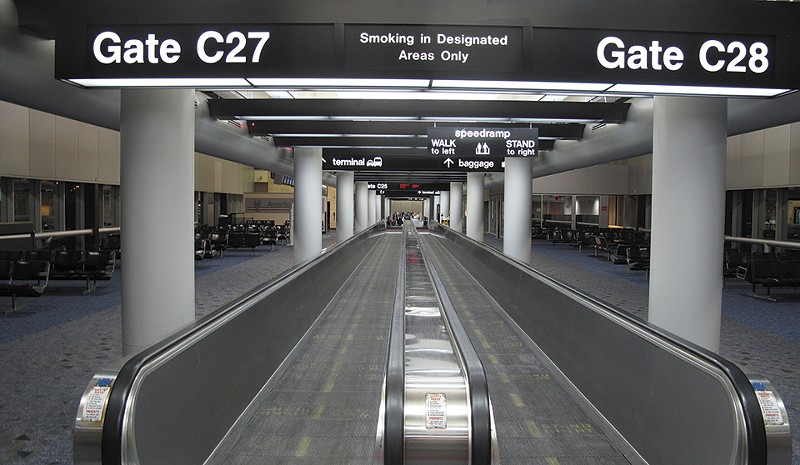
Fundamentally, Principato says the privatization question comes down to a city's specific goals.
"The best reasons to do it have to do with whether there are better and more efficient ways to run the airport," he says. "Are there better and more efficient ways to generate the financing that you need? Probably the worst reason is to just get a pile of cash, because you can only do that once."
The airlines are also a critical factor. Currently, Lambert's major source of traffic is Southwest Airlines, which commands more than 50 percent of Lambert's air traffic by weigh. The FAA requires any privatization deal to meet approval from at least 65 percent. Without its approval, St. Louis' application would be dead on arrival. (A Southwest spokesman says that while it is too early in the process to comment, the company is "open to working with the city and doing what's best for the community and airport users.")
Airline consent could be a major complication for any private operator. In a 2014 analysis by the federal Government Accountability Office, private-sector stakeholders complained that privatization deals overseas generally include just two parties, the seller and prospective buyer. By including both airlines and the federal government, the FAA crowds the negotiations with four parties.
A 2017 follow-up report warned that private investors angling to increase profit by jacking up airport landing fees or rent "may bring them into conflict" with the airlines. And beyond that specter potentially souring the deal on the front end, it could have catastrophic effects for any airport they actually take over.
"What do you think the biggest competition is for St. Louis' airport right now?" Principato asks rhetorically. "The answer you usually get is Kansas City and Chicago. But the competition for your airport is every other airport. If I'm an airline, I can take my main asset and fly it 500 miles per hour away from you and you'll never see me again. The airlines can go anywhere in the country where they feel they can make incrementally more revenue."
Still, airlines have shown themselves amenable to privatization in the past, and some strategies for a private operator would raise revenue without touching the airlines, such as expanding (or raising prices on) concessions, retail and parking services.
Then again, as Chicago found out in 2008, even a done deal can be undone by outside forces. That year, an unanticipated economic collapse forced the winning bidder to back out of its promised $2.5 billion up-front payment and 99-year lease as its financing turned to sludge.
In privatization circles, "Chicago" may as well be an epithet. The same year the Midway deal fell apart, the city, desperate to chip away at its $9 billion unfunded pension liability, inked a 75-year contract to lease its parking meter operation and fee collection to a private consortium for $1.15 billion — just the sort "pile of cash" mindset Principato warns against. Indeed, the deal soured almost immediately, as the consortium raised prices and positioned itself to reap long-term profits far above what it paid the city.
The parking meter deal produced a scorching public rebuke for then-mayor Richard Daley, one reason the city's next mayor, Rahm Emmanuel, took a far more cautious approach to a second attempt to privatize Midway. Emmanuel sought a shorter-term lease and required bidders to agree to revenue sharing and a "Travelers' Bill of Rights" to protect customers from price-gouging.
But those conditions cut too deeply into the bidders' valuation. When one of two possible bidders pulled out in 2013, Emmanuel finally ended Chicago's seven-year flirtation with privatizing Midway.
"We must be willing to say 'no' when partnerships don't measure up to our standards," Emmanuel said at the time. In total, Chicago's failed Midway experiment cost the city more than $16 million.
And the only successful version of the experiment, in San Juan, poses a "unique situation," as Steve Van Beek warns.
Van Beek worked directly with a bidder who bought a second round of shares at that airport. He notes that the airport wasn't just looking to expand its capacity or optimize its concession sales; instead, Puerto Rico was struggling to fulfill the basic tasks of an airport even as it struggled with big debts. The airlines involved agreed that it would be better to remove the airport's operation from government control.
"That confluence of circumstances — a state in debt, airlines and airport agreeing that the current government authority isn't working and therefore we need to change it — those are conditions that are aligned in very few places at very few times," he says. "Puerto Rico is a good example of the [pilot program] working, but whether it's a good example that can be applied to other airports, I'm less sure."
A former official in Clinton's Department of Transportation, Van Beek has observed the FAA's flirtation with privatization from its inception.
"I always thought the program was doomed to fail," he says.
Nearly two decades later, he still believes privatization is a worthy option for airports, but he echoes Principato's cautionary perspective.
"There should be a rational chain of thought about what the issues are and why privatization is either the preferred method of doing it, or a method that should be considered," he says. "The big question is, what is the problem they want to solve?"
To Slay, that problem is an airport that left its potential in the past. But with his retirement, it's up to Krewson and her allies to figure out what that means for the future.
For now, the city's leaders debate an unrefined idea wrapped in a mysterious and as-yet-unexplained contract with an unknown private company or companies. Its elected lawmakers struggle to adjust to the whiplash-realization that their city is even considering such a deal — while Rex Sinquefield, the man bankrolling the process, lurks in the background as every Democrat's villain even as his spokesman insists he has the city's best interests in mind.
Perhaps we are like the public in 1927, waiting warily for reports of the Spirit of St. Louis' safe landing. Our hands aren't on the controls, but there is a sharp hope in the air. What a triumph it could be. Or, what a disaster.
Follow Danny Wicentowski on Twitter at @D_Towski. E-mail the author at [email protected]

